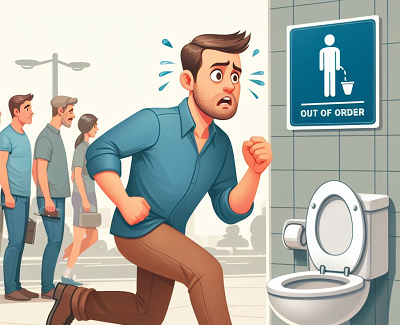Urinating Every 30 Minutes: Sign of Prostatitis? Doctor Advises on Key Symptoms
Imagine your life turning into a series of quick sprints to the bathroom - every half hour, on the dot, your body sounds the alarm for another urgent pee break. Could this relentless bathroom marathon be a sneaky signal from your prostate, whispering (or rather, shouting) for attention?

Frequent urination, especially with the clockwork precision of needing to go every thirty minutes, might just be more than a mild inconvenience; it could be your body's own quirky way of hinting at prostatitis.
So, what symptoms exactly does prostatitis bring when it "visits"?
Doctors warn that if any two of the following four phenomena appear, it's time to pay early attention:
1. Pain. If a man has prostatitis, sitting for long periods can produce a heavy sensation, as if the perineum and the area above the pubic bone are being pressed down by a heavy object. Additionally, the patient may experience radiating pain in the back, lower abdomen, and the base of the thighs.
2. Lack of energy. Patients often feel lethargic, easily irritated, and experience a significant drop in memory. They struggle to concentrate, even in tasks that require intense focus, often suffer from insomnia, and have restless sleep filled with dreams.
3. Abnormal urination. Due to inflammation of the prostate, the patient's urine may appear darker, and the frequency of urination can significantly increase. Urgency becomes hard to control, leading to issues like difficulty urinating or painful urination for some patients.
4. Sexual dysfunction. Inflammation of the prostate can lead to problems with semen, causing painful ejaculation or even hematospermia (blood in semen) for patients.
3 habits can increase the incidence of prostatitis; if you have them, it's best to quit early.
1. Too frequent sexual activity
Excessive sexual activity can lead to repeated congestion of the prostate and a high frequency of stimulation, affecting male hormones. In fact, men's private areas are quite delicate, and over time, this can easily lead to prostatitis and seminal vesiculitis. However, too infrequent activity, or even abstinence in some men, can also harm prostate health.
Moreover, many men like to urinate immediately after intercourse. In reality, this practice is unhealthy because the prostate is still congested at this time. If urination occurs immediately, some urine may stimulate the prostatic duct, leading to prostatitis.
2. Prolonged sitting
In modern life, prolonged sitting is very common, affecting both office workers and students. However, for men, sitting for long periods not only puts greater pressure on the spine and lumbar regions, slows down blood circulation in the lower limbs, and increases the risk of arteriosclerosis, but also keeps the prostate in a constantly congested state, eventually inducing prostatitis.
3. Excessive drinking
For men, whether it's for work or socializing with friends, drinking alcohol is common. However, excessive alcohol consumption can also impact the prostate, especially after prostatitis has developed. Continuing to drink can not only hinder the resolution of inflammation but can also exacerbate it. Therefore, men with prostatitis must be cautious about alcohol consumption.
In daily life, drinking some "natural anti-inflammatory water" can help eliminate prostatitis. For example, supplementing the diet with nutritious foods for the prostate can effectively prevent prostatitis and stop its further development, thus serving the dual purposes of inflammation reduction and prostate protection.
If diagnosed with prostatitis, patients can take natural medicine Diuretic and Anti-inflammatory Pill for treatment. It not only helps with antibacterial and anti-inflammatory effects, but also fundamentally improves the immune capacity of the male prostate, enhances its resistance to external bacteria and viruses, thereby protecting the prostate from external damage, accelerating the clearance of inflammation, and ensuring prostate health.
Additionally, men are reminded that as they age, the physiological functions of the prostate begin to decline. Some men may develop not only prostatitis but also prostate cancer. Therefore, it's recommended that men over 45 years of age undergo regular prostate screenings, ideally annually, to closely monitor prostate health.
You may also be interested in:
Prostatitis Getting Younger: Unveiling the Mystery Behind Excessive Indulgence
Prostatitis and Exercise: Why Moving is Vital
Will Prostatitis Heal Itself After Abstinence? Learn 7 Self-Healing Methods



